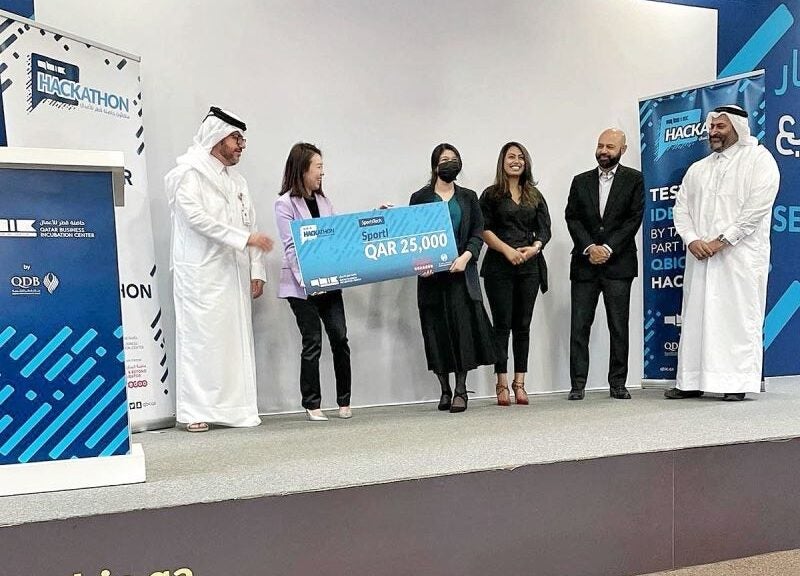Two Georgetown Students Win QAR 25,000 in QBIC Hackathon

Innovative start-ups that use artificial intelligence to enhance medical training and gamification to target an untapped market of sport fans in Qatar won two students at Georgetown University in Qatar (GU-Q) QAR 25,000 ($6,849) each in cash prizes in the 2022 QBIC Hackathon and incentives and support from the Qatar Financial Centre (QFC) to establish their companies.
International Economics major Shokhrukhbek Nurmatov (SFS’23), with teammates Mohammed Sqalli, who has a Ph.D. in Computer Science from HBKU, and Mukhammadjon Gafurov from CMU-Q, won in the competition’s Digital Transformations category for Eyetech, a platform that provides medical personnel training in interpreting critical medical diagnostic tests such as ECG, EEG, and MRIs.
“Despite the critical role these diagnostic tests play in healthcare, a significant number of life threatening findings are missed by medical personnel due to inadequate training,” explained Shokhrukhbek. “So we’ve created a platform that uses AI and eye tracking technology to boost ECG interpretation competencies, and as a result, improves healthcare outcomes.”
With a team representing diverse disciplines from across the QF multiversity system, he explained, their startup benefited from their combined expertise in economics, business development, marketing, biotechnology, clinical research, and software engineering. “QBIC Hackathon 2022 was an amazing opportunity for us to showcase the great potential Eyetech offers to revolutionize the medical training industry,” said Shokhrukhbek.
Competing in the Sportstech category, economics major Rahema Velmi (SFS’23) is developing an app that rewards loyal fans of competitive football, cricket, tennis, and other high viewership sporting events across the globe, with points they can redeem for discounts at participating restaurants, hotels and retail stores. “Sportl is an app that takes fan experience to another level by unlocking the potential to celebrate your team wins and be rewarded through redeemable discounts around Qatar. Small and medium enterprises (SME’s) in Qatar that don’t have an online presence pay hefty marketing costs and find it difficult to target specific customers. Sportl solves that problem by bringing the customers to the business.”
Observing the enthusiasm and energy of fans during the Arab Cup games inspired Rahema to identify missed opportunities in Qatar’s sport field strategies. “As Qatar grows to become a global sports hub, it led me to the idea of capitalizing on fan engagement to benefit both fans and the business sector.” Her team includes her brother, Aasher Velmi, a software engineer, and her father, Faisal Velmi. “The QBIC Hackathon was a fantastic opportunity to bring my idea to life after the positive validation I received from my mentors. People often have an idea but they don’t push to realize its full potential. When I hear negative feedback, it makes me work harder to overcome the challenge.”
The QBIC Hackathon invites faculty, students, professionals, and aspiring entrepreneurs to share their creative solutions to shared global challenges, and provides a platform where that idea can be refined through collaboration, mentoring, prototyping, testing, and presentation.
The competition was held with incubation partner, Ooredoo, and focuses on 4 industry-specific themes: digital transformation, sports technology, manufacturing industries, and digital solutions for Qatar’s economic legacy after 2022.